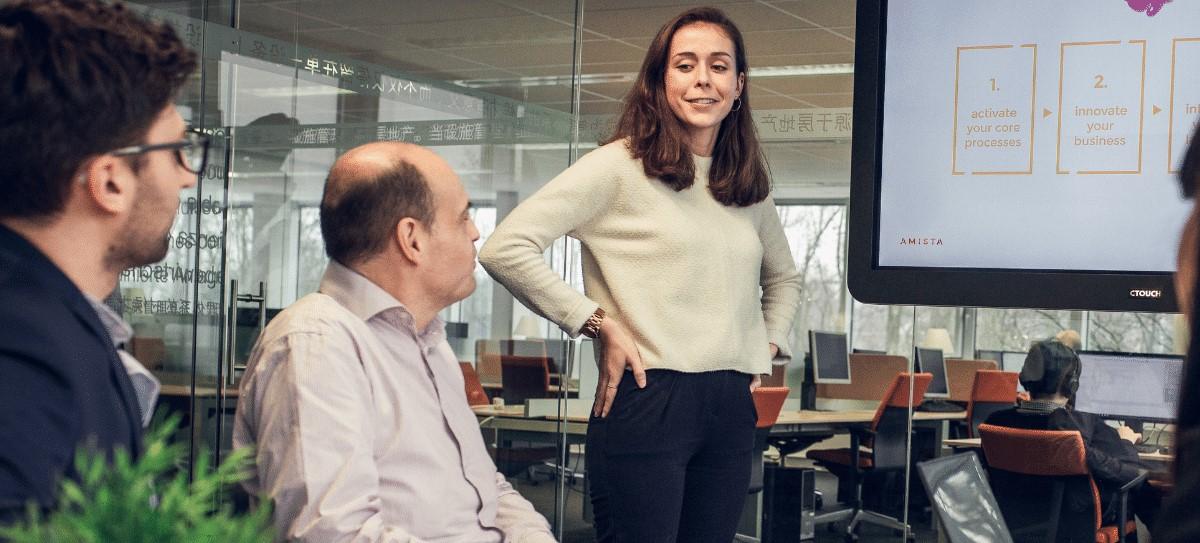Why a learning strategy matters: discover our ‘ZEN’ best practice methodology

How to deal with your learning challenges?
Many businesses face the same challenges when they implement a new learning project:
- Unrealistic deadlines and budget restraints
- Subject Matter Experts with no prior instructional design experience or pedagogical knowledge
- Courses that need to be designed for stakeholders with different goals, preferences and backgrounds
- Remote collaboration
- Assuring the quality of the project
…A lot of time and effort can be wasted during the project because of these challenges. This means that less time is being spent on more important tasks like designing and creating content for the E-learning or collaborating with the different project stakeholders.
To deal with these challenges in the best way possible we created a best practice methodology. A methodology that collects the experiences and knowledge of our learning consultants which can be implemented for both software and non-software training. In general, we created a standard ‘menu’ to reduce development costs and time. It consists of three components:
- Standard processes: for standard projects we use an off-the-shelf planning and offer project templates, to guarantee your project is delivered on time, within budget and with high quality.
- Accelerator package: we offer a package with design templates and visuals for creating the e-learnings. This way, your authors don’t need to waste their time on design.
- Train the trainer: we enable your authors and offer a short train the trainer course to make sure you can curate your own content and keep it up to date.
So why do we call our package ‘ZEN’?
Our accelerators provide a solution that’s tested and ready to go. Because of the standard processes and procedures, time and money are reduced. Furthermore, thanks to the best practices based on real-life experiences the quality of the project is maintained and an effective implementation can be realized. This results in both the client and the consultants remaining at peace throughout the project.
We enable and implement your Litmos training platform or SAP Enable Now e-learning tool from setup to support. By combining pre-configured structures and specific content, we are able to deliver superior learning solutions faster without compromising quality. In general, we created a standard ‘menu’ to reduce development costs and time.
What is our ‘ZEN’ methodology about?
A learning strategy matters because it provides you with a foundation, helps you define the goals of your project and logically explains how your goals have been met.
We based our methodology on a learning strategy model for designing E-learning courses, called ADDIE. ADDIE provides instructional designers with a roadmap for creating e-learning. It is set up like a production line with each step depends upon the successful completion of the previous step.
ADDIE is an acronym for the different steps in the creating process of E-learning: Analyse, Design, Develop, Implement, and Evaluate. For each step standard documents and tools were created to accelerate the development processes.
1. Analyze
In the first phase of the project the training needs, audience and its tasks are being analyzed: What kind of training is needed? What are the characteristics of the audience that needs to be trained and what knowledge or skills need to be developed? To gather all that important information, we created an uncluttered Global Project Overview template with a work breakdown structure and a project checklist.
Despite our standard methodology, the client can of course still choose a more customized package. Based on a decision tree, we sit together with the client to analyze their needs for a more standardized or customized package.
2. Design
Before effectively developing the course, we collect all the necessary information to design the course. In our library structure template, the structure of the E-learning courses is clearly visualized, thus forcing the stakeholders to think about the structure and flow of the E-learning modules beforehand.
To make sure the design stays consistent throughout the project and to increase flexibility, it is recommended to collect the branding guidelines at an early state: what should the main colors, logos, fonts, … of the E-learning be? Our resources template helps to visualize these elements.
For non-software training, we created a storyboarding template where all the visual elements, text elements, audio elements, interactions and branching of every screen are specified. This template should be filled in together with the Subject Matter Experts. Specifying the elements beforehand speeds up the content creation process and leads to effective content.
3. Develop
Our progress track template helps to keep track of the progress of all simulations or other E-learning modules during the development phase. Keeping track of the progress improves stakeholder involvement, leads to effective content development and mitigates risks.
4. Implement
We ‘zenable’ your authors and offer a short train the trainer course to make sure your people can keep your content up to date and retain the knowledge within your company:
- First, we define together what tasks and actions your admin and authors should be able to perform.
- Second, we train your employees to enable them to do their specific tasks within the application.
We practice what we preach: we provide a blended learning curriculum. Your employees will receive instructor-led training, combined with interactive screen recordings (which also serve as support). Furthermore, we offer a basic guide which can be shared.
5. Evaluate
In the last step of the process, we evaluate the E-learning project. Did we meet all the project objectives? Do we need to make changes and plan extra resources? Next, we evaluate the course and its impact on the learners.
Lastly, the client receives an online survey to evaluate the overall quality of the project and the services of our company and consultants. This way we keep optimizing our solutions.
What makes our methodology different?
We have a lot of in-house learning experts, who work exclusively on digital learning projects. Our methodology is designed specifically to implement as many pre-configured elements as possible to speed up the development time and customizable when required to create a solution tailored to your needs.
Discover our ZEN Accelerator Package!
Try our methodology if you want to start ‘ZEN’ with a new digital learning project in the future.
Are you still not sure what to expect? We offer a Proof of Concept version of the Methodology as well. So, don’t hesitate to contact us for more information and we will listen carefully to all your training questions or struggles.

